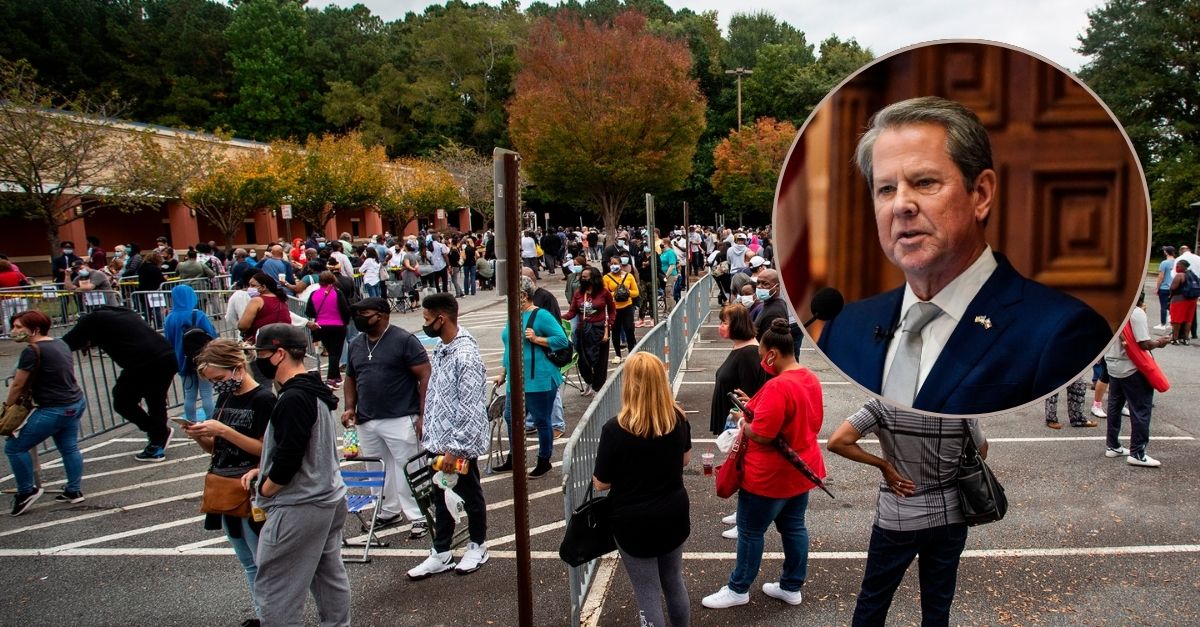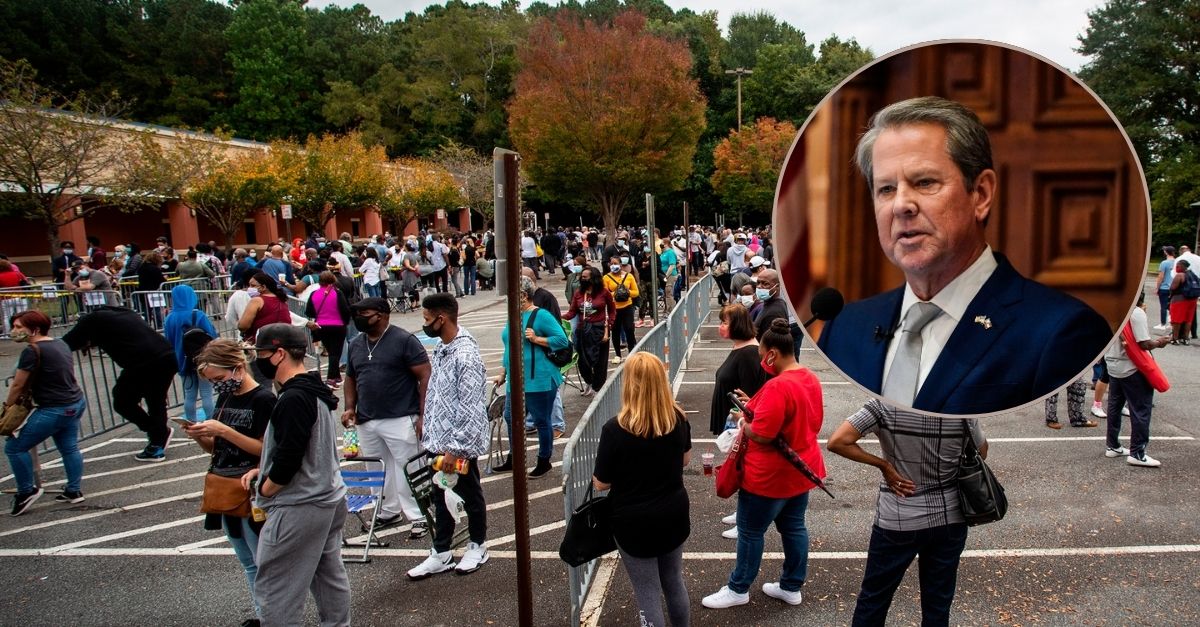

Background: A lot of people waited in line for early voting on Monday, Oct. 12, 2020, in Marietta, Georgia. Some voters waited six hours or more in the former Republican stronghold of Cobb County, and lines wrapped around buildings in Democratic DeKalb County. (AP Photo/Ron Harris). Inset: Georgia Gov. Brian Kemp delivers the State of the State speech, Jan. 11, 2024, in Atlanta. Kemp signed a bill into law Tuesday, May 7, that makes additional changes to Georgia’s election laws ahead of the 2024 election. (AP Photo/Brynn Anderson, File.)
With the 2024 presidential election just six months away, Georgia Gov. Brian Kemp has signed a law that makes critical changes to the state’s election laws, such as increasing the options to challenge a voter’s eligibility and making scanned ballots available publicly online.
In addition, the legislation enacted on Tuesday requires that all election workers in Georgia must be U.S. citizens. Furthermore, for this year’s presidential race, the number of election machines will be reduced, with only one machine for every 250 voters. Georgia is known for long lines at polling places during elections. In 2020, it was reported that voters waited for six or more hours in Cobb County alone to cast their ballots. The Washington Post and several other news organizations reported nationwide, voters waited six or more hours in Cobb County alone to cast their ballots.
Kemp approved the set of laws on the final day of the Georgia General Assembly’s legislative session.
As passed, Senate Bill 189 sets new “probable cause” standards that allow state residents to question a voter’s qualifications to vote. This would include evidence that a person has died, evidence that the person has voted in another jurisdiction, evidence that the person has obtained a homestead exemption on their taxes, or that they are registered to cast their ballot from a non-residential address.
Voters can now be removed from the rolls in Georgia within 45 days of an election. This appears to be in conflict with the National Voter Registration Act of 1993, which the Justice Department notes prohibits the removal of voters from voter rolls within 90 days of the election.
The American Civil Liberties Union said stated that the legislation Kemp signed this week was “unrealistic” and that it struck “at the heart of our democracy.” Andrea Young, the executive director of the ACLU, has also threatened to sue Kemp.
Supporters of the legislation argue that the bill is a way to eliminate inconsistencies and duplicate data on voter rolls; opponents say the bill will make it harder for people to vote and for election workers to process ballots efficiently. In 2021, Georgia passed a law allowing any single voter to issue an unlimited number of challenges to voter eligibility, leading to a large number of challenges, causing delays in early voting in the state.
Significantly, part of SB 189 allows any presidential candidate from any party to appear on the ballot as long as they have been qualified in at least 20 other states. This could be an advantage for independent candidates who may otherwise struggle to gain traction nationally.
Also, the law gets rid of using QR codes for counting votes on ballots, but this change will not start until July 2026. QR code scanning is currently used in the state.
For homeless people in Georgia, SB 189 now requires them to indicate a county voter registration office as their main address, instead of where they currently live or have temporary housing.
The new law also requires absentee ballots to be counted and reported within an hour after polling stations close.
Fair Fight Action, a voting rights advocacy group in Georgia, stated to The Associated Press after the Republican governor signed the laws that Kemp gave a gift to MAGA election deniers.
In addition to SB 189, Kemp also signed House Bill 974 and House Bill 1207 into law.
HB 974 is what Georgia Republicans like Kemp have celebrated as a law that increases public transparency. Before the 2024 election, the public will have access to a database where scanned ballots will be uploaded online but cleared of personal information.
It is not clear what cybersecurity measures Georgia will have to ensure ballot source data is not hacked or made public before any necessary redactions are made, or who will be in charge of quality control on redactions, if anyone. A representative for Secretary of State Brad Raffensperger did not immediately respond to a request for comment on Wednesday.
HB 974 does specify that “digital images of the scanned ballots created during the initial counting process must be posted by 5:00 PM on the second Friday after the election day” and the posts must be supplemented with “any additional ballot images” until the election is finally certified.
By approving HB 1207, Kemp has now imposed a requirement across the state that all election workers must be U.S. citizens. The law also reduces the number of voting machines at each polling location to one machine per 250 voters. In 2022, a local Georgia news outlet WXIA confirmed with the state secretary that there were at least 7,008,203 active voters. It is important to note that “active” voters are different from “total” voters.

